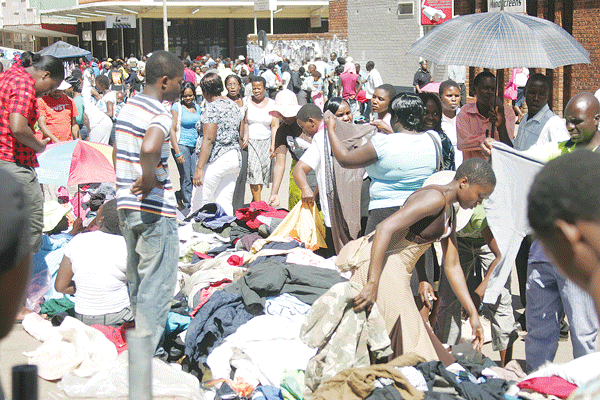SECONDHAND clothing continues to flood the Zimbabwean market, taking a significant share of the clothing market and leaving local manufacturers teetering on the brink of collapse, an industry official has said.
Zimbabwe Clothing Manufacturers' Association chairperson, Jeremy Youmans told NewsDay that second-hand clothing has continued to enter the market and now chews a huge chunk of the clothing market.
"It does not appear that import licensing is being applied by the government, nor the correct duties being applied by Zimbabwe Revenue Authority (Zimra). Duty is payable at 40% plus $2,50 per kg on the value of the clothing. It is irrelevant because they were sourced for free or at a minimal cost," he said.
"Zimra is supposed to apply duty based on its value. From the prices these goods are being sold, it is clear that the system is not working. It is impossible for a manufacturer to compete with these garments, as they are sold at prices below the costs of the raw materials used to make them, as they were donated by people to give to the very poor who cannot afford to clothe themselves."
Youmans said they have made submissions to the Industry ministry requesting further interventions in the mid-term budget to save the clothing industry from collapse.
"There is a need for more to be done as the country is still flooded with imports. This is not just a case of the local industry not being able to compete with imports. We will never compete on everything," he said.
"But many goods come into the country without the correct duties being paid. The international market is not a level playing field, with other countries like China, paying between 13% and 17% export incentives to their manufacturers".
Youmans said, in South Africa, the government has spent billions of rand on productivity and competitiveness schemes for their clothing industry.
"No matter what they are called, they effectively subsidise production costs," he said.
Youmans said clothing manufacturers rebate (CMR) and the removal of second-hand clothing from the open general import licence has been in place since 2013 and has had a significant effect on the industry's ability to compete against imported goods.
The CMR allows clothing manufacturers to import raw materials, which are not manufactured in Zimbabwe, duty free on the basis that they are then used to manufacture finished garments.
The concept has since been extended to six other industries including textile and furniture manufacturing, Youmans said.
"However, we are still experiencing problems with the implementation of CMR. There are still many products, which were left off the list of raw materials to be included and Zimra continue to apply conditions to the approval of companies to utilise CMR, which are punitive and have led to many manufactures not being able to get on the rebate scheme. We continue to lobby for these impediments to be corrected," he said.
- newsday
 Concern over Masvingo black market
Concern over Masvingo black market  Kenya declares three days of mourning for Mugabe
Kenya declares three days of mourning for Mugabe  UK's Boris Johnson quits over Brexit stretegy
UK's Boris Johnson quits over Brexit stretegy  SecZim licences VFEX
SecZim licences VFEX  Zimbabwe abandons debt relief initiative
Zimbabwe abandons debt relief initiative  European Investment Bank warms up to Zimbabwe
European Investment Bank warms up to Zimbabwe  Young Investment Professional (YIP) Graduate Programme 2019
Young Investment Professional (YIP) Graduate Programme 2019 











 Young Investment Professional (YIP) Graduate Programme 2019
Young Investment Professional (YIP) Graduate Programme 2019
Editor's Pick